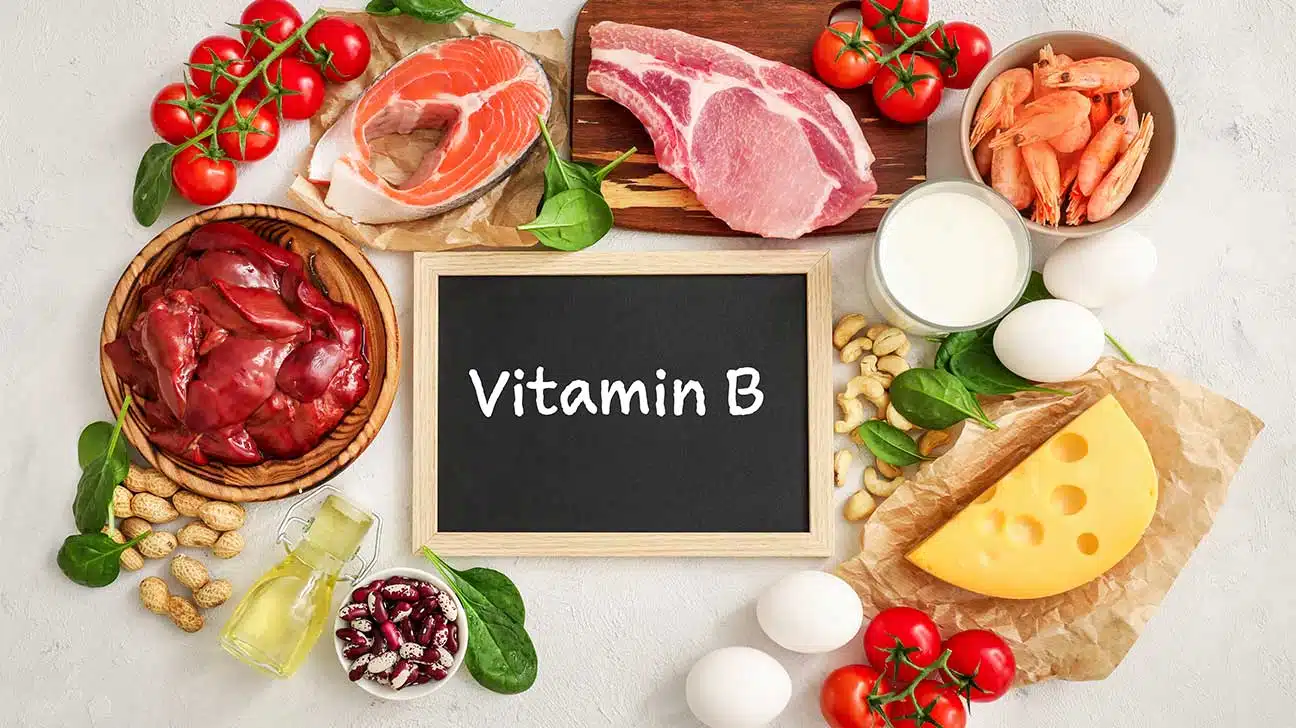
Vitamin B, also known as thiamine, is an essential nutrient. It helps convert food to energy, which is critical for the functioning of vital organs, including the brain.
Heavy alcohol use, a common sign of alcohol addiction, can cause a deficiency in your body’s thiamine levels, or vitamin B1.
This, along with other vitamin deficiencies, is associated with a number of adverse side effects, including alcoholic brain disease, or Wernicke-Korsakoff syndrome.
What Is Vitamin B?
Vitamin B is an essential vitamin that is required by all tissues. It’s not produced in the body, but must be ingested through one’s diet. This vitamin can be found in a variety of foods.
Sources of vitamin B include:
- poultry
- beef
- pork
- tuna fish
- soybeans
- nuts
- seeds
- legumes
- eggs
- whole grain products (e.g. cereals, bread, rice, flour)
This nutrient is important for the metabolism of carbs, fats, and proteins consumed, as well as other important functions within the brain and nervous system.
What Is The Link Between Drinking Alcohol And Vitamin B Deficiency?
Alcohol abuse, or excessive alcohol consumption, has a strong link to vitamin B/thiamine deficiency. Up to 80% of those with alcohol use disorder develop this deficiency.
According to the National Institutes of Health (NIH), the ethanol in alcoholic beverages disrupts the gastrointestinal system’s absorption of vitamin B (i.e. malabsorption) and can reduce its stores in the liver.
Alcohol use disorder is also associated with general malnutrition, due to insufficient food intake and other vitamin deficiencies that can be caused by heavy drinking.
What Are The Symptoms Of Vitamin B Deficiency?
Vitamin B deficiency can be mild to severe. Symptoms may vary depending on the severity of the deficiency, as well as the length of time you have been thiamine-deficient.
Common signs or symptoms of vitamin B deficiency might include:
- loss of appetite
- weight loss
- blurry vision
- nausea and vomiting
- irritability
- confusion
- short-term memory loss
- weakness
- enlarged heart
What Are The Risks Of Vitamin B Deficiency From Alcohol Use?
Vitamin deficiencies aren’t harmless. A depletion of thiamine/vitamin B in particular is associated with several medical complications that can become severe if left untreated.
Anemia
Thiamin deficiency can cause megaloblastic anemia, a condition where the red blood cells have become enlarged and are not functioning properly.
Wernicke’s Encephalopathy
This thiamin-related neurological disorder is the first phase of Wernicke-Korsakoff syndrome, also known as alcoholic brain disease or “wet brain.”
This is an acute, life-threatening phase of Wernicke-Korsakoff syndrome, with symptoms that include: confusion, loss of muscle coordination, and ocular disturbances.
Korsakoff’s Psychosis
The second phase of Wernicke-Korsakoff syndrome is a long-term disorder that is associated with symptoms of psychosis, including hallucinations and severe short-term memory loss.
This phase, typically caused by chronic thiamine deficiency, is generally not reversible.
Treatment For Alcohol-Related Vitamin B Deficiency
Alcohol-related vitamin B deficiency is treatable if it’s caught before it becomes chronic or very severe. A full treatment plan for this might include both medical and behavioral health treatment.
Nutritional Supplements
A nutritious diet and nutritional supplements may be recommended if you have a vitamin B deficiency that’s related to your alcohol abuse or alcohol dependence.
B vitamins (e.g. vitamin B6, vitamin B12), as well as folic acid (B9), folate, and vitamin A, are commonly deficient in those with chronic alcohol use disorder.
Therefore, vitamin B-complex and additional supplements may be recommended or administered within a treatment program if you are found to be vitamin deficient.
Other supplements commonly recommended to combat the effects of alcohol abuse include vitamin D, niacin, and vitamin C.
Alcohol Rehab Programs
Addressing an alcohol-related vitamin B deficiency must also address the cause. And for that, an alcohol rehab program may be recommended.
Alcohol addiction treatment begins with detox for alcohol withdrawal. An inpatient or outpatient rehab program may then offer behavioral therapy, counseling, medication, and other treatments.
Find Help For Alcohol Use Disorder Today
Alcohol use disorder is a risk factor for many problems, including liver disease and vitamin B deficiency.
If you or a loved one is looking for alcohol treatment, call our helpline to find treatment options today.
Addiction Resource aims to provide only the most current, accurate information in regards to addiction and addiction treatment, which means we only reference the most credible sources available.
These include peer-reviewed journals, government entities and academic institutions, and leaders in addiction healthcare and advocacy. Learn more about how we safeguard our content by viewing our editorial policy.
- Alcohol and Drug Foundation
https://adf.org.au/insights/alcohol-related-thiamine-deficiency/ - U.S. National Institute on Alcohol Abuse and Alcoholism (NIAAA)
https://pubs.niaaa.nih.gov/publications/arh27-2/134-142.htm - U.S. National Institutes of Health (NIH)
https://ods.od.nih.gov/factsheets/Thiamin-HealthProfessional/


